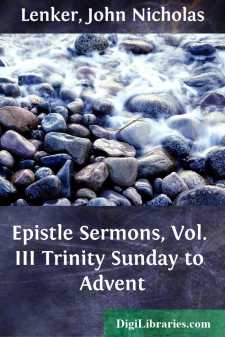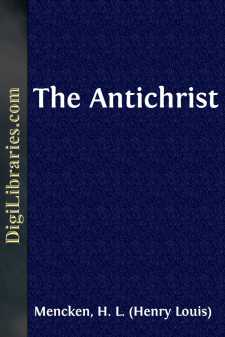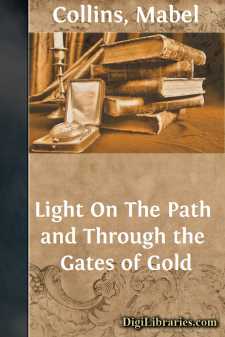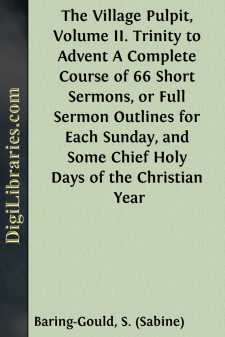Religion
- Agnosticism 2
- Antiquities & Archaeology 21
- Atheism 12
- Biblical Criticism & Interpretation 15
- Biblical Meditations 3
- Biblical Reference 1
- Biblical Studies 11
- Buddhism 8
- Christian Church 52
- Christian Education 5
- Christian Life 26
- Christianity 60
- Cults 2
- Devotional 6
- Eastern 2
- Education 4
- Eschatology 1
- Ethics 3
- General 60
- Gnosticism 1
- Hinduism 15
- History 28
- Holidays 10
- Inspirational 1
- Islam 8
- Judaism 3
- Leadership 1
- Meditations 3
- Monasticism 1
- Mysticism 11
- Philosophy 4
- Prayer 26
- Prayerbooks 5
- Religion & Science 12
- Sermons 54
- Spirituality 53
- Theism 2
- Theology 17
- Theosophy 15
Religion Books
Sort by:
Foreword Here comes the English Luther in his twelfth visit to your home. In peasant boots, decorated by no star of worldliness nor even by the cross of churchliness, but by the Book from heaven pressed to his heart in a firm attitude of earnest prayer, he comes as the man of prayer and of the one Book, a familiar friend, to help you to live the simple Christian life. This volume of twenty-four...
more...
INTRODUCTION Save for his raucous, rhapsodical autobiography, “Ecce Homo,” “The Antichrist” is the last thing that Nietzsche ever wrote, and so it may be accepted as a statement of some of his most salient ideas in their final form. Notes for it had been accumulating for years and it was to have constituted the first volume of his long-projected magnum opus, “The Will to Power.” His full...
more...
CHAPTER I. From The Creation to The Fall. Gen. Chs. 1-3 Problems Solved. This simple narrative solves some of the great problems about which philosophers have speculated and before which scientists have stood baffled. Every child of the human race has asked, "What is the origin of the material world, what is the origin of life, and what is the origin of sin?" In general the philosophers held...
more...
by:
Chris Viljoen
Have you ever wondered about the end? Are you unsure about how much of it you will personally experience? Maybe the Revelation is total darkness for you... Look no further! In this guide you will find easy-to-understand explanations of every description in Revelation. Creative illustrations make it easy to color your imagination. Find out with us how Jesus finally wins! Look together through the...
more...
We are pleased to present this free digital edition of the Vishnu Purāna, translated into English by the renowned scholar Manmatha Nath Dutt. This classic work forms part of our continuing effort to make the treasures of Hindu sacred literature accessible to readers across the world. The Vishnu Purāna is one of the eighteen Mahāpurānas, the major Purānic texts of Hindu tradition. Among these, it...
more...
by:
Lothrop Stoddard
INTRODUCTION THE DECLINE AND FALL OF THE OLD ISLAMIC WORLD The rise of Islam is perhaps the most amazing event in human history. Springing from a land and a people alike previously negligible, Islam spread within a century over half the earth, shattering great empires, overthrowing long-established religions, remoulding the souls of races, and building up a whole new world—the world of Islam. The...
more...
by:
Unknown
CHAPTER I The beginning of the gospel of Jesus Christ, the Son of God; as it is written in the prophets, "Behold, I send my messenger before thy face, which shall prepare thy way before thee. The voice of one crying in the wilderness. Prepare ye the way of the Lord, make his paths straight." John did baptize in the wilderness, and preach the baptism of repentance for the remission of sins. And...
more...
by:
William Arnot
We have been accustomed to regard with affectionate veneration the life-work of the Reformers, and the theology of the Reformation. Of a later date, and in our own vernacular, we have inherited from the Puritans an indigenous theology, great in quantity and precious in kind,—a legacy that has enriched our age more, perhaps, than the age is altogether willing to acknowledge. At various periods from...
more...
by:
Mabel Collins
LIGHT ON THE PATH I These rules are written for all disciples:Attend you to them. Before the eyes can see, they must be incapable of tears. Before the ear can hear, it must have lost its sensitiveness. Before the voice can speak in the presence of the Masters it must have lost the power to wound. Before the soul can stand in the presence of the Masters its feet must be washed in the blood of the heart....
more...
INTRODUCTION.—An ancient writer informs us that when the Egyptians named their Greatest God who was over all, they cried thrice, "Darkness! Darkness! Darkness!" And when we come to speak of the great mystery of the Holy Trinity, the utmost we can do is to repeat their cry, and say, "Darkness! Darkness! Darkness! In the name of the Father—Darkness, and of the Son—Darkness; and of the...
more...











